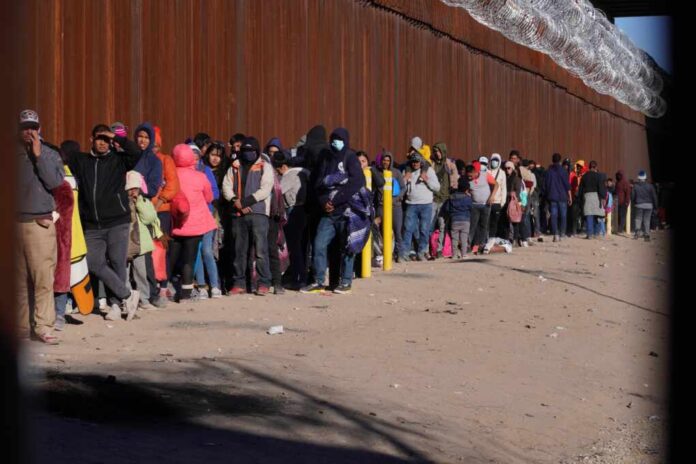
The last week has seen the House Freedom Caucus once again at the forefront of fighting for heightened border security measures by influencing House Speaker Mike Johnson (R-LA) to integrate a robust border security bill into the upcoming spending legislation crucial to prevent a government shutdown.
The Secure the Border Act of 2023, known as H.R. 2, represents a significant shift toward stringent border management, aiming to dismantle the Biden administration’s “catch and release” policy and mandating the resumption of construction on the border wall. The GOP-led House passed H.R. 2 nine months ago, and the Democrat-controlled Senate has failed to move the bill forward.
The House passed the Secure the Border Act on May 11, 2023.
REAL border security has been sitting on Senator Schumer’s desk for 283 days.
🔗: https://t.co/yQA2bzO1xN pic.twitter.com/B3wOXj2r4x
— Heritage Foundation (@Heritage) February 18, 2024
House Freedom Caucus Chair Rep. Bob Good (R-VA) discussed the necessity of coupling government funding with tangible border security measures with Just The News on Friday. He emphasized the failure of the previous Financial Responsibility Act. He pointed to the quickly evaporating opportunity to leverage government funding to ensure the administration’s commitment to securing the border.
House Freedom Caucus pushing Johnson to attach border security bill to next CR in March https://t.co/wmVPhw1sPT
— John Solomon (@jsolomonReports) February 18, 2024
The ongoing discourse within the Republican ranks points to a deeper divide, particularly with the introduction of a bipartisan bill that intertwines Ukraine aid with border security enhancements. This development has sparked controversy among conservative circles, with Freedom Caucus members like Reps. Scott Perry (R-PA) and Eli Crane (R-AZ) vehemently opposing the compromise, viewing it as insufficient and a diversion from the pressing border crisis.
This emerging conflict underscores a broader ideological battle within the GOP, with conservatives pushing for a standalone border security measure devoid of unrelated foreign aid commitments. The proposed legislation, critiqued for prioritizing international interests over domestic security, has led to calls for a rejection of the bipartisan approach, advocating instead for a focus on the direct and immediate needs of the American people.
The stance taken by the House Freedom Caucus reflects a growing sentiment among conservatives that national security should not be compromised or diluted with foreign aid packages. This position resonates with a significant portion of the American electorate, who seek decisive action and clear priorities from their representatives.
Amid these debates, the introduction last week of the Defending Borders, Defending Democracies Act by a group of moderate House lawmakers seeks to find middle ground. It proposes a blend of aid for allies and stringent border measures. However, this approach has faced criticism from both sides of the aisle. As time passes, it becomes more apparent that Americans deserve independent debate over border security and foreign aid issues without entangling their very different objectives.
































